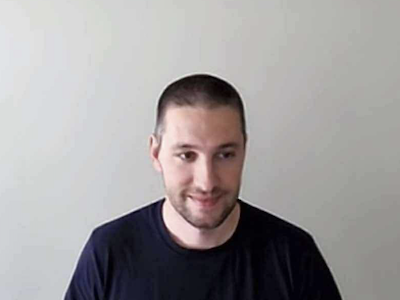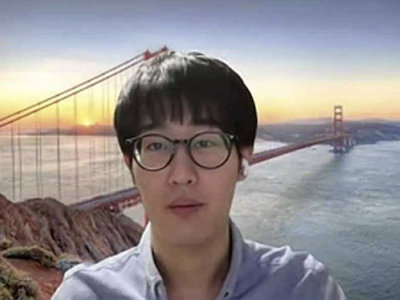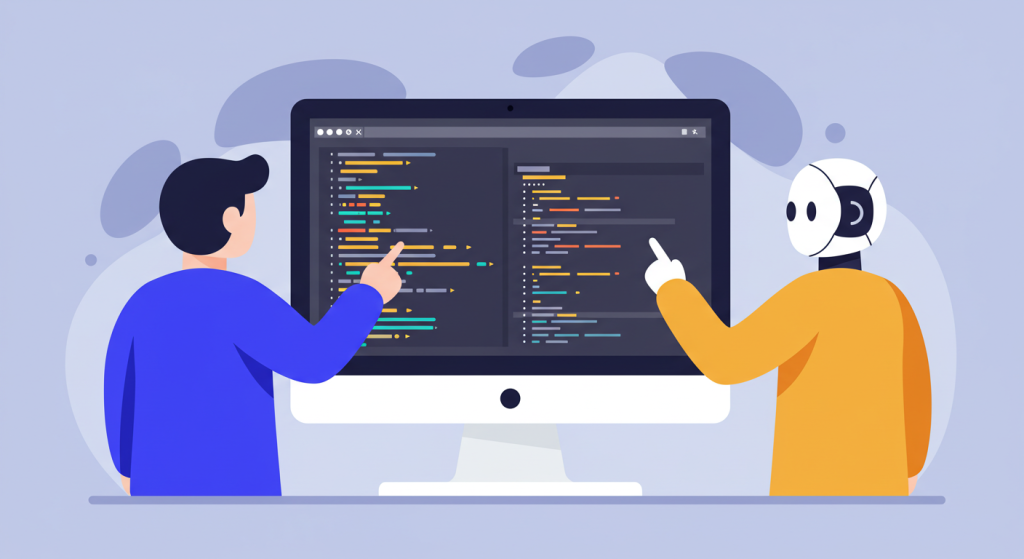株式会社LOWWS CTOのスラヴィ・パンタレーブ(Slavi Pantaleev)と、株式会社LOWWS プログラマーのルボミル・ポポヴ(Lyubomir Popov)にインタビューし、現在携わっているプロジェクトの中で興味深い技術や最新の知見について聞いていくコーナーです。
今回はスラヴィとルボの二人に、AIは人間から仕事を奪うのか、どれくらい取って代わるのかについてそれぞれの考えを聞きました。
日本語の記事に続いて英語の記事があります。
This is an interview with Slavi Pantaleev, CTO of LOWWS Inc., and Lyubomir Popov, programmer at LOWWS Inc., where we explore interesting technologies and the latest insights from their current projects.
This time, we asked two people, A and B, for their thoughts on whether AI will take jobs from humans and to what extent it will replace them.
The English article follows the Japanese article.
AIは仕事を奪うのか?ソフトウェア開発者の視点から

スラヴィ:はい、ではAIが私たちの仕事を奪うのか、それともどの程度人間に取って代わるのか、という話をしましょうか。これはネット上でもよく議論されている話題ですよね。いろんな人がいろんなことを言っています。実際のところどうなるかは分からないですけど、今のところはまだ大丈夫だと思っています。 AIは、初級の開発者がやるような基本的な作業をこなすことができます。なので、若手層の仕事が多少奪われていたり、就職が難しくなったりしているかもしれません。もしくは、若手としてキャリアをスタートさせたい場合には、これまでとは異なるスキルセットが求められると思います。
以前は、単純で退屈だけどとても時間がかかって、かつ自動化が難しい雑務のような作業が多かったです。だからこそ人間が時間をかけて対応していたんですね。でも今は、その一部をAIができるようになっています。だから、その部分の仕事はもう人間には回ってこないということです。 とはいえ、若手の開発者もAIをうまく使って作業を進めたり、後からコードレビューをしたりといった役割は持てると思います。つまり、仕事の内容が変わるだけで、今の時点では完全に仕事がなくなるわけではないと思います。 でも、最終的にどうなるかは分かりません。理想を言えば、AIがすごく賢くなってくれたおかげで、人間が何の仕事もしなくてよくなる、っていう未来がくればいいですね。頭を使う仕事も、肉体的な仕事も含めて全部。農業なんかも完全に自動化されて、そうなれば人間はもっと創造的なこと――アートとか音楽とか、科学の研究とか――に集中できるようになります。 で、一部の人は、いずれはAIがその創造的な分野も乗っ取って、人間に代わって科学の発展を担うようになるとも言っています。でも、それが現実になるのは当分先の話だと思います。まあ、誰にも分からないですけどね。

ルボ:現時点では、AIは人間を置き換えるというよりは、ソフトウェア開発者の生産性を向上させるために使われるべきだと思います。今の段階では、AIはまだ人間の代わりにはなれないと思います。 ソフトウェア開発で特に難しいのは、クライアントが何を求めているのかを正しく理解することです。こういう具体的なプロジェクトになると、AIが役立つかどうかは正直まだ分からないです。現時点ではあまり役に立たないですが、将来的には対応できるようになるかもしれません。 なので、今のところは人を置き換えるよりも、生産性を高めるために使う方が良いと思います。
スラヴィ:最近見たコメントで、「マネージャーの方が、現場の人よりも早くAIに置き換えられるんじゃないか」っていう話があったんです。AIって、タスクの要約とか、進捗のフォローアップ、スケジュールのチェックみたいな作業が得意なんですよね。 だから、一部のプロジェクトマネージャーとかはAIに置き換えられて、その分、上流工程や下流のプログラミングをやる人が増えるんじゃないか、という話でした。
ルボ:例えば、10人でやっていた仕事があるとして、AIツールの力で生産性が50%上がったら、同じ仕事を7人でこなせるようになるかもしれませんよね。そうなると、チームの人数を減らすことができる。これがAIが人を置き換えるひとつの形なのかもしれません。 ただし、AIに何をさせるかを理解している人は、まだ必要なんですよね。少なくとも今の段階では、AIに任せたとしても、セキュリティ的な抜け穴があったり、パフォーマンスに問題があったりするコードを作る可能性があります。だから、AIが書いたコードをレビューできる人は、やっぱり必要です。
スラヴィ:そうですね。それで思い出したんですが、最近、やや古いですが面白い本を読みました。1946年に出た『Economics in One Lesson(世界一シンプルな経済学)』という本です。経済の本なんですが、機械が導入されたときに人々がどう社会を見ていたかとか、政策や関税といった政府の対応が長期的にどう経済に影響を与えるか、といったことが書かれていて面白いんです。 本の中で言っていたのは、10人の仕事が8人でできるようになったという話をしても、それは人がいらなくなったという意味ではないということです。長い目で見ると、失業するわけではなくて、別のところに移動するという話なんですね。 もちろん短期的には生活が厳しくなったりして大変ですが、全体としては役割が変わっていくだけで、最終的にはみんな新しい仕事を見つけて、うまく回っていくということです。
ルボ:たしかに、そうなるとは思いますけど、実際にはその移行期間に「何が起きているのか分からない」とか「どうなるか不安」といった不確実な時間があるのは避けられないですよね。
スラヴィ:ええ、そうですね。
ルボ:たとえば、営業用のWebサイトを作りたいとしますよね。ひとつの方法は、ゼロからコードを書いたり開発者を雇ったりすることです。でももう一つは、OpenCartやWordPress+WooCommerceのような、すぐに使えるプラットフォームを使う方法です。 こういった既成のツールを使えば、カスタム開発をしなくてもサイトが作れるわけで、開発者が不要になったとも言えるかもしれません。
スラヴィ:でも、結果的には逆のことが起きていませんか?
ルボ:たしかにそうですね。細かい要望やカスタマイズが必要になると、結局は人が必要になります。AIを使う場合でも同じで、ある程度はAIの仕組みを理解している人がいないと、正しい結果にはならないんですよね。
スラヴィ:基本的に、人間が完全に置き換えられることはないと思います。少なくとも今はまだです。今の時代って、いろんなことが手軽にできるようになっていますよね。たとえば、自分でWebサイトを作るとか、AIのちょっとした助けを借りて作るとか。そういうので満足する人たちもいて、そういう人たちはもう僕たちのようなカスタム開発の顧客にはならないでしょう。でも、もっと特別なものが必要な人たちは、やっぱり誰かを雇うことになりますよね。 この分野って、だいぶフラットになってきてると思うんですけど、それでもプロの仕事っていうのはちゃんと残るんです。AIがあっても、一人ではすべてをこなすことはできません。 最近、僕はAIを使って音楽を作るっていうのを試してるんですけど、なかなか面白いですよ。自分の曲を作るのって楽しいですし、家族とかのために使うには十分です。ただ、それはあくまで趣味レベルであって、商業レベルの音楽じゃないですね。世の中には、やっぱりプロのミュージシャンが必要です。上手なミュージシャンとか、プロの人たちは、まだAIに置き換えられていないです。少なくとも、今のところは。
ルボ:AIツールを使うことで、この分野に入るためのハードルは確かに下がってきていますよね。でも、だからといって、何かカスタムなものや専門性の高いものを作りたいなら、やっぱり専門家の助けは必要です。 どうなるかは、これから見ていくことになると思いますけど、十分に訓練されたAIなら、ある特定のタスクに関しては本当に良い仕事をするようになると思います。
スラヴィ:チップもどんどん高速化していますから、時間が経てばさらに性能は良くなっていくでしょうね。ただ、重要なのはチップだけじゃないんですよ。
ルボ:AIはデータで訓練される必要があるので、いずれは自分自身が作ったデータで訓練されるようになるでしょう。つまり、使えるデータには限界が出てくるということですね。 たとえば、今のAIはソフトウェア開発の能力を高めるために、GitHubとか他のオープンソースのプラットフォームにあるプロジェクトで学習しています。でも、そこには素晴らしいプロジェクトもある一方で、そうでもないプロジェクトもあります。
スラヴィ:十分な訓練を積めば、AI自身が「どのプロジェクトを学習対象にすべきか」「どれは見るべきじゃないか」「何をしちゃいけないか」みたいなことも判断できるようになるかもしれませんね。いずれ自己調整できるようになるかもしれません。でも、もちろんその全体を指揮するのは人間です。 僕は、AIとロボティクスは今後数年で私たちの生活を大きく変えると思っています。個人的には、家庭内の雑務を手伝ってくれるようなロボットが出てくるんじゃないかと期待しています。たとえば、食洗機からお皿を取り出して所定の場所に片付けるとか。そういうのはロボットでもできそうですよね。 食器や衣類を自動で洗えるのはすごいことですが、家庭内の細かい作業って、まだまだ手作業が多いんですよ。そして、現実の世界――農作業や畜産なんかでは、もっと手作業が必要ですよね。そういうところでも、ロボットは助けになると思います。特に、人間と会話ができたり理解できるロボットだったら、なおさらです。
ルボ:それは本当にそうですね。でも、ロボットには手作業の仕事を任せて、私たち人間は楽しいことをやる、っていう方向にしたいですよね。逆に、ロボットが楽しいことをして、人間が単純作業をやるなんて、いやですよ。
スラヴィ:その通りですね。それが理想です。

ナオト:では、ざっくり結論としては「まだ私たちは安全」ってことですね。
ルボ:しばらくは、そうですね。
スラヴィ:まあ、そうだと思います。ただ、これから就職しようとしている人にとっては、少し怖い話かもしれませんね。僕たちは、もうキャリアの中盤くらいですから。
ナオト:キャリアの折り返し地点ですね。
スラヴィ:そうですね。でも、新しい開発者には、新しいスキルセットが求められると思います。
ルボ:そうですね。
ナオト:今の時代に新しく開発者になる人は、私たちがやっていることとはかなり違う仕事をすることになるんじゃないでしょうか。
ルボ:ツールって常に進化していますからね。AIがなくても、常に最新の技術についていく必要があります。今知っている技術も、5年後にはもう市場で通用しない可能性がありますよね。AIがあろうがなかろうが、そうなんです。
スラヴィ:ほんとにそうですね。この業界は、とにかく変化が速い。
ルボ:そう。絶えず進化しています。常に新しいツールや新しい技術が出てきて、生活を楽にすることもあれば、逆に難しくすることもある。でも、やっぱり変化が常にある分野です。
スラヴィ:最初の頃と比べても、本当に大きく変わりましたよね。ソフトウェア開発が始まった頃の状況と、今とではまったく違います。当時の人たちも、たぶん不安だったと思いますよ。「もっと高度な技術が来る。自分たちの半分は不要になるんじゃないか」って。 常に何かが変わって、また次の何かがやってきて、それを繰り返して今があるわけです。僕たちが今の立場から過去を見ても、当時の人が何をやっていたのか、想像もつかないことばかりですよ。
ルボ:「唯一の不変は変化だけ」っていう言葉もありますしね。
スラヴィ:本当にその通りですね。いいポイントです。
Will AI Take Our Jobs? A Software Developer’s Perspective

Slavi: Okay, yeah, let’s discuss if AI will take our jobs or to what extent AI can take them or replace humans. This is a topic that is very often discussed online. I see various people saying various things. I’m not sure exactly what’s going to happen, but I think for now we’re safe. AI can do some rudimentary work like a junior developer. So maybe it’s stealing some jobs from juniors or making it more difficult to get into the job market. Or at least when you’d like to start as a junior developer, you will need a different skill set. Previously it was more like grunt work. You would be given some tasks to do something very boring and simple, but very time-consuming, so it couldn’t be automated easily. So you had to spend a lot of time on that. And now AI can do some of that. So this job is gone from you.
But I think junior developers can still manage the AI to do the task and do the code review later. So they will have different tasks. Even those jobs will not be eliminated as it is right now. But in the end, I’m not sure. Hopefully we can all benefit from artificial intelligence being very smart and we don’t have to do any work—mental or physical. Farms will be fully automated, everything will be. Then humans can focus on other pursuits—being creative, art, music, science—continuing to push the boundaries. And some say at some point AI will even take that and be smarter and push science instead of people. I don’t think we’re going to be there anytime soon, but who knows.

Lyubo: I think for now the AIs should be better used to enhance productivity for software developers. At the moment, I don’t think they’re ready to replace people. One of the more difficult things in software development is understanding what exactly the client wants. For more specific projects, this is one of the things I don’t know if AI will help with. Currently it won’t, but at some point it probably will. For now, I think it’s better used to enhance productivity than to replace the workers.
Slavi: I saw some comments that managers may be replaced earlier than actual people doing the work because AI is very good at summarizing tasks, following up, checking schedules, doing things like that. Someone said maybe managers will be first to be reduced—not all of them, but some project managers could be replaced in favor of more people doing higher-level work or lower-level programming.
Lyubo: If you have some job that’s done by 10 people, and you can increase productivity by 50% with AI tools, and you still have the same workload, this could lead to having a smaller team. So instead of 10 people, you might need 7 to do the same job. That’s maybe one way AI will replace people. But you still need to have some people who know what they’re doing. At least at the moment, if you don’t know what you want the AI to do, it might create something with security holes or performance issues. So you still need someone to review all that code written by AI.
Slavi: Yeah, And speaking of AI replacing people, I recently read an interesting, very old book. It’s called “Economics in One Lesson”, from 1946. It’s kind of a book on economics, but interesting in how people viewed the world when machines were introduced and how different policies or government solutions—even tariffs—affected the economy long-term.
One thing they say is, we talk about 10 people being replaced by 8. But in the long term, these are not really replacements. These people won’t be jobless—they’re just moved around. This can be very difficult and terrible for their livelihood, but it’s just shifting roles. These people would get new jobs eventually. Everything would fall into place.
Lyubo: Yeah, it will at some point, but there will be a time of uncertainty about what’s going on and how it’ll turn out.
Slavi: Yeah.
Lyubo: In the end, say you want to build a sales website. One way is to write it from scratch or hire developers. Another is to use readily available platforms like OpenCart or WordPress with WooCommerce. You could say WooCommerce with WordPress is replacing developers, because no custom development is necessary anymore.
Slavi: But the result is the opposite, isn’t it?
Lyubo: Yeah, sometimes. If you want specifics and custom changes, it’s the same even with AI. You need someone who knows how AI works, at least to some extent, to get the correct outcome.
Slavi: Basically, people—it won’t completely replace them. At least not yet. Things are more approachable nowadays. People can make their own websites by themselves or with a little help from AI. For some, that will be enough, and they’ll never become our customers for custom development. But for others who need something more special, they’ll need to hire someone. The field is more equalized, but professional work still remains. One person, even with AI, can’t tackle everything.
Recently I’ve been experimenting with AI for making music. It’s fun to make your own songs, but it’s just for fun or family use. It’s not professional music that you can sell. Popular musicians will still have a place. Good musicians, good professionals—they’re not being replaced by AI. At least not yet.
Lyubo: The barrier of entry into the field is getting lower using AI tools. But that doesn’t mean that if you want something custom or specialized, you won’t need help from specialists. We’ll see how it goes. With enough training, AIs will probably do a great job with certain tasks.
Slavi: Chips are getting faster, so time will help them get even better. But it’s not just chips.
Lyubo: They need to be trained on data, and at some point they’ll be trained on data created by themselves. There’ll be a limit to the data they can use. For example, AIs doing software development now are mostly trained on open source projects from GitHub and other platforms. There are great projects there, but also not-so-great ones.
Slavi: Hopefully with enough training, AI can learn which projects to look at and which ones to skip—or learn what not to do. Maybe it’ll sort itself out. But of course, humans would still orchestrate all this. I think AI and robotics will massively overtake our lives in coming years. I’m hopeful we’ll get personal robots to help around the house with tasks that can’t yet be automated. Like taking things out of the dishwasher or putting them in place. That could be done by a robot. It’s great that dishes and clothes can be washed automatically, but there’s still so much manual work—even in small things like a household. Even more so in the real world—farming, raising cattle, etc. I think robots could help. Especially robots that can talk and understand humans.
Lyubo: That’s true. But let’s keep robots doing the manual work and let us do the fun stuff—not the other way around.
Slavi: Sounds good. That’s how it should be.

Naoto: So the short conclusion is: I think we’re still safe.
Lyubo: For a while, yes.
Slavi: I guess so. I think this could be scary, especially for people that are about to enter the job market soon. For us, we are already halfway across, maybe.
Naoto: Halfway through your career.
Yeah. But I guess new developers need another—skill sets.
Slavi: Yeah.
Naoto: So I think a new developer in this age will be doing a pretty different job from what we’re doing now.
Lyubo: Tools are constantly evolving, so even without the AIs, you still need to keep current with the current technologies. For example, with the things that you know now, in five years, you may not be relevant to the market—even without the AI.
Slavi: True, yeah. This field is moving fast anyway.
Lyubo: Constantly evolving. Constantly you have new tools, new technologies that you can use to make your life easier—or sometimes harder. But yeah, it’s a constant change.
Slavi: Even looking from the start. From the start of software development, it has changed so much compared to where we are now. Those people would also have found it scary—maybe in the 70s they would see, “Oh, something higher level is coming. It will replace half of us.” Everything is changing, then something else comes, and it has changed so many times across the years. And for us, looking at it from here, it’s very, very different. We can’t even imagine what those people were doing.
Lyubo: There’s a saying: the only constant thing is change.
Slavi: Yeah. Good point.
この記事はインタビューをもとにAIを使用して作成されています。 This article was created using AI based on interviews.
